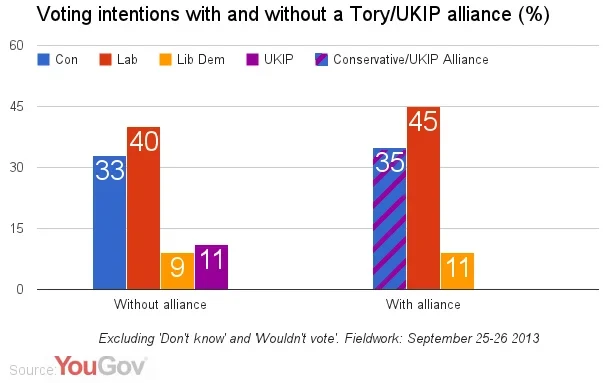In our poll this morning for the Sun the Conservatives had 33% support, Labour 40%, the Liberal Democrats 9% and UKIP 11%. While it would be a gross exaggeration to say all of UKIP's support comes from the Conservative party, they do gain a disproportionate amount of support from ex-Tories and it's natural for people to add together that Conservative 33% and that UKIP 11% and think what might be.
The reality though may not be as simple as adding the two together. In yesterday's poll we also asked people to imagine that UKIP and the Conservatives agreed a pact at the next general election where they would not stand against each other, with UKIP backing the Conservative candidate in most constituencies and the Conservatives backing the UKIP candidate in a small number of constituencies. We then asked how they'd vote under those circumstances. Once you've taken out the don't knows and wouldn't votes, the new Conservative/UKIP alliance would be on 35% of the vote (up just two points on their current support), Labour would be on 45% (up five points on their current support), the Liberal Democrats on 11% (up two points), 9% of people would vote for other parties (down eight points).

So what goes wrong, how does 33 plus 11 equal only 35?
The bottom line is that parties don't own their voters - even if the Conservative party and UKIP were to want a pact, it wouldn't follow that their voters would be happy to play along. Amongst people who currently vote UKIP 56% would vote for the new Conservative/UKIP Alliance, but that leaves 44% of them who wouldn't - who would go to Labour, or stay at home, or find an alternative non-mainstream party to back. Many of the people voting UKIP are doing so because they are unhappy or disillusioned with the government or the Conservative party (or in many cases with *all* the mainstream parties). A deal between the Conservatives and UKIP is not necessarily going to make them any less unhappy or disillusioned, many would just find a different way of expressing it at the ballot box.
Meanwhile a quarter of current Tory supporters wouldn't vote Tory if they entered a pact with UKIP - 5% would switch to Labour, 4% to the Lib Dems, 16% would stay at home or are not sure what they'd do. A deal with UKIP might get many UKIP voters back on board, but it would lose voters in the centre to Labour and the Liberals. Equally the Conservative core selling point at the moment is the claim they are the safe pair of hands, the party willing to make the tough and hard-headed decisions needed to get the economy back on solid ground. UKIP's well documented teething-troubles with amateurism, gaffes and somewhat eccentric people who have attached themselves to the party during its rapid growth may not be exactly complementary to that message.
But if parties don't own their voters, can't buy and sell them in electoral pacts, that also means the Conservative party can target UKIP's voters without necessarily needing to deal with UKIP - although once again, the difficulty is doing so without alienating more centrist voters. The overwhelming majority of current UKIP voters say they would be more likely to vote Conservative if they promised harsher policies on immigration... but that would risk the Conservative party losing more moderate votes and playing to negative perceptions that it was bigoted or racist. However, 57% of UKIP voters say they will be more likely to vote Conservative if the economy improves, 40% if they thought it was the only way of stopping Ed Miliband being Prime Minister. There are ways the Conservatives can appeal to UKIP voters without necessarily aping their policies.
Anthony Wells is associate director in YouGov’s Political and Social Research team, and creator of the blog UK Polling Report.
This blog originally appeared at the Spectator Coffee House.
Image: Getty






